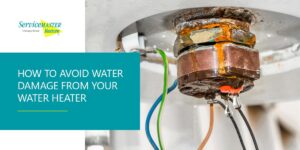
Water leaking from your water heater can cause a significant amount of damage to your home. A leaking water heater can lead to mold or mildew, structural damage, and peeling paint that can be expensive to fix.
Preventing your water heater from leaking is essential to keep your home safe from the consequences of water damage. Below, we’ll show you what signs to look out for that indicate your water heater might have outlived its usefulness, ways to minimize damage, and solutions if you have a water leak.
Signs Your Water Heater Is About to Quit
Catching issues early can allow you to avoid larger problems down the line, so you’ll want to look for signs that your water heater is about to give out on you. The following are common signs that your water heater may be acting up:
- Your water doesn’t reach the temperatures that it used to.
- Rust is coming from faucets or ends up on your clothes.
- Your hot water tastes metallic.
- You hear a cracking or popping noise when your water heater is on.
- You see rust accumulating around the bottom of your water heater.
- There is water around the base of the heater, indicating a leak.
- Your burner units are clogged or have developed rust.
If you notice any of these signs, your water heater is either due for a replacement or needs maintenance and repairs. It’s best to start solving the problems as soon as possible to prevent a leak or keep it from leaking more than it already has.

Ways to Minimize Potential Water Damage
Pooling water can soak into your home’s structure, causing mold build-up and expensive structural damage. While the causes of water heater leaks can vary, you can take steps to prevent a water heater flood. Consider the following for water heater flood protection:
- Consider your heater’s age: Water heaters aren’t designed to last your entire lifetime and will eventually age out of their usefulness. If your water heater is over seven years old, it may be time to replace it. If your water heater is starting to reach the end of its life span, keep a more eye out for potential issues. An older water heater is more likely to have problems, and investing in a newer model can minimize your risk of water damage.
- Look at your anode rod: Your water heater’s anode rod helps prevent corrosion and rust that could lead to leaks and cause potential water damage. The anode rod will rust instead of the tank — you’ll want to regularly check the rod to see how much it has deteriorated. If you’re noticing signs of deterioration, you may want to replace the rod to prevent the corrosion from reaching your tank.
- Consider an inspection: An annual inspection can help prevent leaks that lead to water heater damage. A plumber can look at your water tank to determine if there are issues you may be unable to spot. They’ll conduct various tests and inspect your water tank’s components to ensure everything is in working order.
- Insulate your tank: Insulating your tank can prevent heat loss, save you money, and protect against corrosion that causes leaks. You can use a DIY method to insulate your tank or contact a professional for the job.
- Conduct regular maintenance: Regular maintenance can help prevent your water heater from developing leaks and ensure it continues to work. You should flush your water tank about once a year to remove corrosion that could lead to leaks.
How to Stop Your Water Heater From Leaking
If your water heater is already leaking, follow these steps:
- Verify the leak is coming from your water heater: First, you’ll want to determine if your water heater is actually leaking or if you’re simply seeing condensation. You can find out by wiping down your water heater and waiting to see how the moisture builds up. Condensation will build evenly on the surface of your water heater, while a leak will create more water in one place than another. You’ll also want to ensure the leak isn’t coming from another appliance, such as your HVAC unit.
- Turn off the power supply to your water heater: Once you’ve determined that your water heater is the source of your leak, you should turn off the power supply before starting work. Working on a water heater with an electric or gas supply turned on can be dangerous.
- Shut off the water supply: You’ll also want to stop the cold water supply to your water heater before you start looking for the leak. Look for pipes with a valve near your water heater — the pipe with the cold water supply is often blue. If your pipes aren’t color-coded, you can tell which is the cold one by carefully feeling the pipe’s temperature.
- Look for the leak’s source: Now that you’ve turned off your power and water supply, you can start looking for the leak. You’ll want to check multiple locations, including the pipes, pressure relief valve and the tank, as there could be cracks causing the leak. If the tank is cracked, you’ll need to replace your water heater rather than repair the damage.
- Clean the standing water if possible: If you have standing water from a leak, you’ll want to soak it up with towels or another method to prevent any further water damage.
- Contact your technician: If your water heater is still leaking after you’ve fixed one problem, contact your technician to have them look at your unit. They can determine if there’s a deeper issue and help you reach a solution.
If your water heater leak has caused any damage, you’ll want to contact a professional who can assist with mold removal and water extraction. These services ensure that water damage won’t cause further problems in your home.
Call ServiceMaster of Lincoln Park for Water Damage Restoration
Water damage can happen to anyone. It’s essential to remedy the problem as soon as possible to prevent damage that could impact your health and your home’s structural integrity, putting you and your family at risk. Businesses could also be putting their patrons at risk with untreated water damage. If you need help with water damage, the professionals at ServiceMaster of Lincoln Park are here to help.
Our water damage restoration services are available to those in the Chicago area, whether you need us to remove water build-up or eliminate mold and mildew growth. We’re available 24/7 to ensure that we’re there to respond as soon as disaster strikes. We’ll help reduce the disruptions in your life and get your home or business back in order quickly and efficiently. Contact us or call (773) 346-6767 today to learn more about our services!


